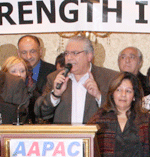
|
|
Arab American Political Action Committee activists stand with public officials during AAPAC’s annual dinner on Thursday at the Bint Jebail Cultural Center in Dearborn. PHOTOS: Nafeh AbuNab/American Elite Studios |

|
|
AAPAC Endorsement Chair Abed Hammoud |
Hammoud spoke about the extensive process the group goes through before every major election, making endorsements and sending thousands of newsletters to Arab American homes.
Founded in 1997, the group conducts interviews with candidates who request endorsement in the weeks before announcing choices ahead of municipal and national elections.
The group donates to some campaigns and AAPAC volunteers, primarily Arab American students from local college campuses and even high schools and elementary schools, work the polls and phones and go door-to-door to bring out voters on election days.
“Our name is the Arab American PAC, but we are not just for Arab Americans,” said Hammoud about the group’s reach and endorsement standards.
“We don’t do work just for our community,” he said. “We do work for our city, our state and for our country.”

|
|
AAPAC President Osama Siblani |
But he said that despite all the major world issues that remain on the minds of most Arab Americans, Thursday night was about local political participation, and showing up at the polls in unprecedented numbers on Nov. 3.
“If we are not successful in our lives here, then how can we ever expect to help the rest of the world,” he said.”Next week, we are going to be making decisions that will affect our every day lives… While others stay home and think it’s not an important election, let every registered Arab American go out and vote.”
“We are here and we are here to stay and we are an important member of this political equation,” he said.
He said the Detroit area schools, economy, public services, health and safety depend on the ability of informed communities to show up at the polls in small elections.

|
|
Hussein Berry accepts a community service award from AAPAC leadership Thursday. |
Berry was also given a community service award by the group.
“I know him as a tireless advocate for children,” said AAPAC member Aimee Blackburn as she presented Berry the award.
AAPAC also presented public service awards to Gail Mee, President of Henry Ford Community College and Dearborn City Councilwoman Suzanne Sareini.

|
|
President of Henry Ford Community College Gail Mee accepts an AAPAC public service award presented to her by Hammoud. |
He said the community college, with Mee at the helm, has dramatically increased enrollment and added a program in which students can receive an associate’s degree in Arab cultural studies.
“She’s one of the greatest public servants we have in this city,” he said.
AAPAC Secretary Nabih Ayad said Sareini, who is also endorsed by the group in her bid for re-election, has “always kept her doors open to the community to help whenever she could.”
Sareini said, looking out at the gathering of about 600, that the Arab American community has reached a level of participation and organization that many thought impossible when she first ran for the council 20 years ago.

|
|
Suzanne Sareini receiving a public service award from AAPAC Secretary Nabih Ayad. |
Youth organizer Tarek Baydoun, after receiving an AAPAC member of the year award, recognized the community’s student activists for being the backbone of the organization’s political rallying and organizing efforts.
“The students are the ones who stand at the polls and educate the voters,” he said. “The students are the ones who make the phone calls. The studenst are the ones who inspire the adults.”

|
|
Chicago-based comedian Ray Hanania performs Thursday at the AAPAC banquet. |
“My kid is so patriotic he’s turned me into the FBI three times this week,” he said.
Oakland County Sheriff Michael Bouchard, an Arab American who is running for governor in 2010, also spoke at the event.

|
|
Oakland County Sheriff Michael Bouchard |
Siblani said he was asked to comment during the event on Wednesday’s FBI raids on a local group that officials described as a radical Muslim organization engaged in criminal activity.
He said that though the charged group had nothing to do with the Arab American community, he would make one statement:
“Muslims who commit crimes, just like Christians and Jews who commit crimes, do not do so because of their religion. They do it in spite of their religion.”






Leave a Reply